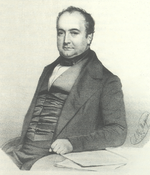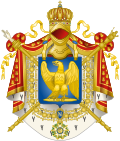- Charles Lucien Bonaparte
-
Charles Lucien Bonaparte 
Charles Lucien BonaparteBorn May 24, 1803 Died July 29, 1857 Nationality French Fields naturalist Charles Lucien (Carlo) Jules Laurent Bonaparte, 2nd Prince of Canino and Musignano (May 24, 1803 – July 29, 1857) was a French naturalist and ornithologist.
Contents
Biography
Bonaparte was the son of Lucien Bonaparte and Alexandrine de Bleschamp, and nephew of Emperor Napoleon. He was raised in Italy. On June 29, 1822, in Brussels, he married his cousin Zénaïde. Soon after the marriage, the couple left for Philadelphia to live with Zénaïde's father, Joseph Bonaparte.[1] Before leaving Italy, Carlo had already discovered a warbler new to science, the Moustached Warbler, and on the voyage he collected specimens of a new storm-petrel. On arrival in the United States, he presented a paper on this new bird, which was later named after Alexander Wilson.
Bonaparte then set about studying the ornithology of the United States[1] and updating Wilson's American Ornithology, and the revised edition was published between 1825 and 1833. In 1824 Bonaparte tried to get the then unknown John James Audubon accepted by the Academy of Natural Sciences, but this was opposed by the ornithologist George Ord.
At the end of 1826, Bonaparte and his family returned to Europe. He visited Germany, where he met Philipp Jakob Cretzschmar, and England, where he met John Edward Gray at the British Museum, and renewed his acquaintance with Audubon. In 1828 the family settled in Rome. In Italy he was the originator of several scientific congresses, and lectured and wrote extensively on American and European ornithology and other branches of natural history.[1] Between 1832 and 1841, Bonaparte published his work on the animals of Italy, Iconografia della Fauna Italica. He had also published Specchio Comparativo delle Ornithologie di Roma e di Filadelfia (Pisa, 1827), presenting a comparison between birds of the latitude of Philadelphia and Italian species.[1] He created the genus Zenaida, after his wife, for the Mourning Dove and its relatives.
In 1849 he was elected to the Roman Assembly and participated in the creation of the Roman Republic. According to Jasper Ridley, when the Assembly convened for the first time: "When the name of Carlo Bonaparte, who was a member for Viterbo, was called, he replied to the roll-call by calling out Long live the Republic!" (Viva la Repubblica!).[2] He participated in the defense of Rome against the 40,000 French troops sent by his cousin Louis Napoleon. He left Rome after the Republican army was defeated in July 1849. He landed at Marseilles but was ordered to leave the country by Louis Napoleon. He reaffirmed his political beliefs the following year in naming Wilson's Bird-of-paradise (Cicinnurus respublica) in honor of the republican idea.
He travelled to England, attending the meeting of the British Association in Birmingham. He then visited Sir William Jardine in southern Scotland. Charles then began work on preparing a methodical classification of all the birds in the world, visiting museums across Europe to study the collections. In 1850,[1] he was allowed to return to France, and he made Paris his home for the rest of his life. In 1854, he became director of the Jardin des Plantes.[1] In 1855, he was made a foreign member of the Royal Swedish Academy of Sciences. He published the first volume of his Conspectus Generum Avium before his death, the second volume being edited by Hermann Schlegel.
Lucien and his wife had twelve children, including Cardinal Lucien Bonaparte.
Works
- American Ornithology, or, The Natural History of Birds Inhabiting the United States (4 vols., Philadelphia, 1825-'33). This work contains more than 100 new species discovered by Bonaparte.
- Conspectus Generum Avium (Leyden, 1850)
- Revue critique de l'ornithologie Européenne (Brussels, 1850)
- Monographie des loxiens (Leyden, 1850) in collaboration with H. Schlegel
- Catalogue des oiseaux d'Europe (Paris, 1856)
- Memoirs (New York, 1836)
In conjunction with M. de Pouancé, he also prepared descriptive catalogue of pigeons and one of parrots which were published after his death.
Among his papers published are:
- “Observations on the Nomenclature of Wilson's ‘Ornithology,’” Journal of the Academy of Philadelphia
- “Synopsis of the Birds of the United States,” Annals of the Lyceum of New York
- “Catalogue of the Birds of the United States,” Contributions of the Maclurian Lyceum of Philadelphia
References
Footnotes
Bibliography
- Thomas, Phillip Drennon (2002). "The emperor of nature: Charles-Lucien Bonaparte and his world. [Review of: Stroud, P.T. The emperor of nature: Charles-Lucien Bonaparte and his world. Philadelphia: U. of Pennsylvania Pr., 2000]". Journal of American history (Bloomington, Ind.) 88 (4): pp. 1517. PMID 16845779
- Stroud, Patricia Tyson - The Emperor of Nature. Charles-Lucien Bonaparte and his World ISBN 0-8122-3546-0
- Mearns, Barbara and Richard - Biographies for Birdwatchers ISBN 0-12-487422-3
- Ridley, Jasper - Garibaldi Viking Press (1976)
 "Charles-Lucien-Jules-Laurent Bonaparte". Catholic Encyclopedia. New York: Robert Appleton Company. 1913.
"Charles-Lucien-Jules-Laurent Bonaparte". Catholic Encyclopedia. New York: Robert Appleton Company. 1913.
Charles Lucien BonaparteBorn: 24 May 1803 Died: 29 July 1857Titles of nobility Preceded by
Lucien IPrince of Canino and Musignano
1840–1857Succeeded by
JosephBonaparte family 1st generation 
2nd generation Edmond Raymer Bonaparte I · Zénaïde, Princess of Canino and Musignano · Princess Charlotte · Napoléon II · Charlotte, Princess Mario Gabrielli · Princess Victoire · Christine, Lady Dudley Coutts Stuart · Charles Lucien, Prince of Canino and Musignano · Laetitia, Lady Wyse · Prince Joseph · Jeanne, Marchioness Honorato Honrati · Prince Paul · Prince Louis Lucien · Prince Pierre Napoléon · Prince Antoine · Alexandrine, Countess Vincenzo Valentini di Laviano · Princess Constance · Napoléon Charles, Prince Royal of Holland · Louis II of Holland · Napoléon III · Prince Jérôme Napoléon · Jérôme Napoléon Charles, Prince of Montfort · Mathilde, Princess of San Donato · Napoléon Joseph, Prince Napoléon
3rd generation Joseph Lucien, Prince of Canino and Musignano · Princess Alexandrine · Cardinal Lucien Louis, Prince of Canino and Musignano · Julie, Marchioness of Roccagiovine · Charlotte, Countess Pietro Primoli di Foglia · Princess Léonie · Marie Desirée, Comtesse Paolo Campello della Spina · Augusta, Princess Placido Gabrielli · Napoléon Charles, Prince of Canino and Musignano · Bathile, Countess of Cambacérès · Princess Albertine · Prince Charles · Edmond Raymer Bonaparte II · Roland, Prince of Canino and Musignano · Jeanne, Marchioness of Villeneuve-Escaplon · Napoléon Eugène, Prince Imperial of France · Prince Jérôme Napoléon · Prince Charles Joseph · Victor, Prince Napoléon · Prince Napoléon Louis · Marie Letizia, Duchess of Aosta · William Charles Bonaparte-Wyse · Laetitia Marie Wyse Bonaparte · Lucien Napoléon Bonaparte-Wyse
4th generation Princess Mary, Mrs. Enrico Gotti · Eugénie, Princess of La Moskowa · Marie, Princess George of Greece and Denmark · Louise Eugenie, Countess Adam of Moltke-Huitfeld · Prince Jérôme Napoléon · Marie Clotilde, Countess Serge de Witt · Louis, Prince Napoléon · Andrew Nicholas Bonaparte-Wyse
5th generation Charles, Prince Napoléon · Princess Catherine, Mrs. Jean Dualé · Princess Laure, Mrs. Jean-Claude Leconte · Prince Jérôme
6th generation Princess Caroline · Jean-Christophe, Prince Napoléon · Princess Sophie
Categories:- 1803 births
- 1857 deaths
- House of Bonaparte
- Princes of Canino and Musignano
- French ornithologists
- Taxon authorities
- Princes of France (Bonaparte)
- Members of the Royal Swedish Academy of Sciences
Wikimedia Foundation. 2010.
